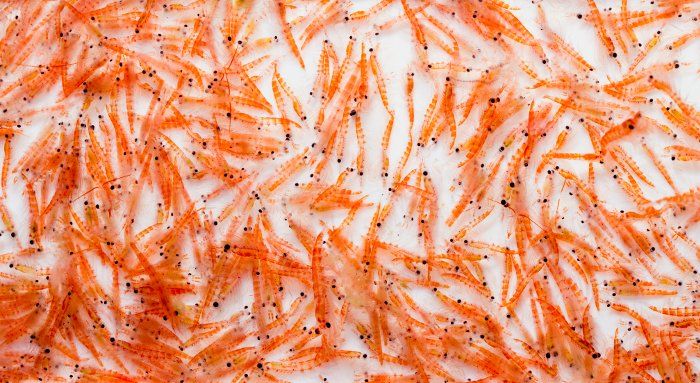Krill Companies Agree Not to Fish in Sensitive Area of Antarctic Ocean
In a move sparked by a Greenpeace action campaign, Antarctic krill fisheries have agreed to cease fishing in sensitive areas of the Antarctic Ocean.
Photo ©iStockphoto.com/Tenedos

In a move sparked by a Greenpeace action campaign, Antarctic krill fisheries have agreed to cease fishing in sensitive areas of the Antarctic Ocean.
While not every fishery has pledged its support, an estimated 85% of krill fisheries are in. They include Aker BioMarine, Rimfrost, CNFC, Insung, and Pesca Chile.
Commercial krill fishing is a decades old practice, supported in part by aquaculture and dietary supplement markets. In recent years, krill oil has emerged as an alternative to fish oil supplements because krill contain high amounts of omega-3 fatty acids.
As much as krill serves humans, it’s an integral part of Antarctica’s food web and so it must be protected. Penguins, seals, whales, and other marine animals rely on steady populations of krill for their diet.
The krill fisheries mentioned in this article have agreed to not fish in huge areas near the Antarctic Peninsula; to create seasonal buffer zones to protect breeding colonies; and to support scientific efforts in other ways. Some, if not all, companies will have to change their harvesting patterns as a result, and it remains to be seen whether this influences krill prices in the future.
“Safeguarding the Antarctic ecosystem in which we operate is part of who we are, and efforts to take care of the environment in which we harvest [are] and always [have] been part of our long-term business and pricing strategy,” said Aker BioMarine (Oslo, Norway) executive vice president Kristine Hartmann in an interview with Nutritional Outlook.
Because not all fisheries-krill or otherwise-have signed onto the voluntary agreement, the pledging companies hope consumers will take notice of their efforts and shop accordingly.
The changing state of business in the Antarctic likely will not be limited to just a few krill fisheries, though. In October, the Commission for the Conservation of Antarctic Marine Living Resources, which regulates all of Antarctic fishing, will decide on whether or not to establish an Antarctic Ocean Sanctuary. It would prohibit fishing of any kind in a protected portion of the Antarctic Ocean spanning 1.8 million square kilometers.
Greenpeace’s krill protection campaign was backed by 1.7 million people around the world. It’s part of a series of actions that could be vital in ensuring the survival of krill and their global markets for years to come. The krill fisheries that made their collective pledge represent the Association of Responsible Krill (ARK) harvesting companies.
Kratom sees impressive sales growth despite its regulatory status and stigma
March 12th 2025Despite its controversy, kratom is a top-selling ingredient that consumers see value in. That said, brands need to work hard to demonstrate safety and quality of kratom products in the absence of legal regulatory status. Will kratom be able to overcome its stigma for even more growth and consumer acceptance?
DOJ asks Utah court to dismiss FTC lawsuit against Xlear Inc.
March 11th 2025On March 10, the DOJ and the defendant filed a stipulation to dismiss with prejudice the lawsuit in which each party agrees “to be responsible for its own costs and fees and agrees that no party shall be responsible to any other party for any fines, costs, fees, or penalties arising from this case.”
HHS announces efforts to eliminate independent conclusion of GRAS
Published: March 11th 2025 | Updated: March 11th 2025U.S. Department of Health and Human Services (HHS) Secretary, Robert F. Kennedy Jr., is directing the acting U.S. Food and Drug Administration’s (FDA) acting commissioner to explore rulemaking that would eliminate the independent conclusion of GRAS provision.











